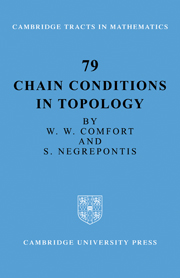Book contents
- Frontmatter
- Contents
- Introduction
- ERRATA
- Acknowledgements
- 1 Some infinitary combinatorics
- 2 Introducing the chain conditions
- 3 Chain conditions in products
- 4 Classes of calibres, using Σ-products
- 5 Calibres of compact spaces
- 6 Strictly positive measures
- 7 Between property (K) and the countable chain condition
- 8 Classes of compact-calibres, using spaces of ultrafilters
- 9 Pseudo-compactness numbers: examples
- 10 Continuous functions on product spaces
- Appendix: preliminaries
- References
- Subject index
- Index of symbols
9 - Pseudo-compactness numbers: examples
Published online by Cambridge University Press: 05 November 2011
- Frontmatter
- Contents
- Introduction
- ERRATA
- Acknowledgements
- 1 Some infinitary combinatorics
- 2 Introducing the chain conditions
- 3 Chain conditions in products
- 4 Classes of calibres, using Σ-products
- 5 Calibres of compact spaces
- 6 Strictly positive measures
- 7 Between property (K) and the countable chain condition
- 8 Classes of compact-calibres, using spaces of ultrafilters
- 9 Pseudo-compactness numbers: examples
- 10 Continuous functions on product spaces
- Appendix: preliminaries
- References
- Subject index
- Index of symbols
Summary
Among the chain conditions considered in this monograph are these three: calibre, compact-calibre, and pseudo-compactness. For the first two of these we have presented, in Corollaries 4.7 and 8.6, respectively, quite satisfactory characterizations of those classes of infinite cardinals which can arise, for some (completely regular, Hausdorff) space X, as the class of infinite cardinals for which the chain condition in question fails for X.
We believe that an equally definitive result concerning classes of pseudo-compactness may be available, but we abandoned the search when we noticed that the general methods used for calibre and compact-calibre do not work here. The difficulty is not in finding, say for a given regular cardinal λ, a space which is pseudo-(α, α)-compact if and only if cf(α) ≠ λ (cf. Theorem 8.1). The difficulty is in finding a space which avoids (as pseudo-compactness numbers) the elements of a given set of cardinals. In brief: pseudo-compactness properties are not preserved by finite products. In the present chapter we document this failure in various ways. There is, for example, Corollary 9.8: for α ≥ β with α ≥ ω and 1 < m < ω there is a completely regular, Hausdorff space X such that Xm-1 is pseudo-(α, β)-compact and Xm is not pseudo-(α, β)-compact.
The examples depend heavily on elementary properties (discussed and derived in the Appendix) of the Stone–Čech compactification β(α) of the (discrete) space α and, more particularly, of the type T(p) of p for p∈β(α).
- Type
- Chapter
- Information
- Chain Conditions in Topology , pp. 218 - 230Publisher: Cambridge University PressPrint publication year: 1982



